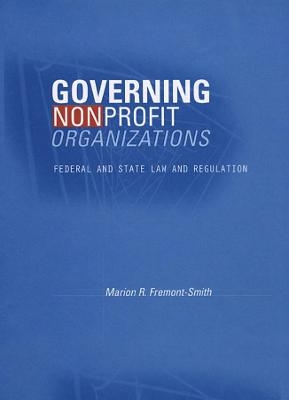
Governing Nonprofit Organizations
The Belknap Press (Verlag)
978-0-674-03045-9 (ISBN)
The nonprofit sector is a vital component of our society and is allowed the greatest freedom to operate. The public understandably assumes that since nonprofit organizations are established to do good, the people who run nonprofits are altruistic, and the laws governing nonprofits have reflected this assumption. But as Marion Fremont-Smith argues, the rules that govern how nonprofits operate are inadequate, and the regulatory mechanisms designed to enforce the rules need improvement.
Despite repeated instances of negligent management, self-interest at the expense of the charity, and outright fraud, nonprofits continue to receive minimal government regulation. In this time of increased demand for corporate accountability, the need to strengthen regulation of nonprofits is obvious. Fremont-Smith addresses this need from a historical, legal, and organizational perspective. She combines summaries and analysis of the substantive legal rules governing the behavior of charitable officers, directors, and trustees with descriptions of the federal and state regulatory schemes designed to enforce these rules. Her unique and exhaustive historical survey of the law of nonprofit organizations provides a foundation for her analysis of the effectiveness of current law and proposals for its improvement.
Marion R. Fremont-Smith is Senior Research Fellow, Hauser Center for Nonprofit Organizations, Kennedy School of Government, Harvard University. She served as Assistant Attorney General and Director of the Division of Public Charities in Massachusetts, and is a retired partner of Choate, Hall and Stewart.
* Preface *1. The Nonprofit Sector in the Twenty-First Century * The Legal Meaning of Charity * Size and Characteristics of the Nonprofit Sector * Current Challenges for Specific Components of the Sector * Religious Organizations * Health Care Organizations * Educational Organizations * Human and Social Service Organizations * Arts and Cultural Organizations * Foundations and Other Grantmakers * How Extensive Is Wrongdoing in the Sector? * Policy Issues Facing the Nonprofit Sector in the Twenty-First Century *2. A Brief History of the Law of Charities * Introduction * Evolution of Charities in Early Society * Islamic Foundations * Charities in England * Development of Trusts * Restrictions on Charitable Gifts * The Statute of Charitable Uses * The Role of the Attorney General and the Charity Commission * Regulation of Charities after 1950 * Developments in Substantive Charity Law after 1601 * Charitable Corporations * Charities in the United States * Development of the Law of Charitable Trusts * Charitable Purposes * Charitable Corporations * State Regulation of Charities * Federal Regulation of Charities: The Internal Revenue Code * Deductibility of Contributions * Federal Reporting and Disclosure Requirements * Congressional Investigations of Charities prior to 1969 * The Walsh Commission * The Cox and Reece Committees * The Patman Committee *1965 Treasury Department Report on Private Foundations * Tax Reform Act of 1969 * Reactions to the Tax Reform Act from the Nonprofit Sector * The Peterson Commission * The Filer Commission * Congressional Activity after the Tax Reform Act of 1969 * Private Foundations * Lobbying by Public Charities * Unfair Competition with Small Businesses * Standards for Exemption of Hospitals * Regulation of Church Activities * Relief for Victims of the Terrorist Attacks of September 2001 * The Effectiveness of the IRS as Regulator * Major Expansion of Federal Regulation: Intermediate Sanctions for Excess Benefit Transactions * Other Changes in Substantive Laws after 1970 * Changing Parameters of the Definition of Charitable Purposes * Application of the Public Policy Doctrine to Definitions of Charitable Purposes * State Action Limitations on Charitable Purposes: The Subsidy Theory * Lobbying * UBIT and Commercial Activities * Regulation of Public Companies and Auditing Firms in 2002 and 2003 * Treasury Department Anti-Terrorist Financing Guidelines * Conclusion *3. Creation, Administration, and Termination of Charities * Charitable Purposes * State Law Definitions * Motives of Donors * Gifts for Charitable and Noncharitable Purposes * Charitable Purposes for Nonprofit Corporations * Requirement of Indefinite Beneficiaries * Definitions in State Tax Laws * The Trust Form for Charities * Creation of Charitable Trusts * Restrictions on the Amount of Charitable Bequests * Duration and Restrictions on Remoteness of Vesting * Termination * Accumulation of Income * Administrative Duties of Trustees * Administrative Powers of Trustees * Discretionary Powers of Trustees * Exercise of Powers by Majority of Trustees * Compensation of Trustees * Exculpatory Clauses * Liability to Third Persons * Court Supervision of Trusts * The Corporate Form for Charities * Development of a Model Nonprofit Corporation Act * Creation of Charitable Corporations * Power of the Legislature to Modify Corporate Charters * Restrictions on Holdings of Charitable Corporations * Duration * Amendment, Merger, and Dissolution * Accumulation of Income * Internal Organization * Administrative Duties of Directors * Administrative Powers of Directors * Discretionary Powers of Directors * Compensation of Directors * Ultra Vires Contracts * Corporations Formed to Administer Charitable Trusts * Trust Rules Inapplicable to Corporations * Reporting Provisions * The Doctrines of Cy Pres and Deviation * Cy Pres * Deviation * Application to Charitable Corporations *4. Fiduciary Duties: State Law Standards * Fiduciary Duties of Trustees: Prudence and Loyalty * Duty of Prudence * Investment of Trust Funds: The Modern Prudent Investor Rule * Standards for Investments * Investment of Trust Funds: Diversification * Duty of Loyalty * Liability of Trustees for Breach of Trust * Exculpatory Clauses * Fiduciary Duties of Corporate Directors: Care * Duty of Care * Reliance * Review of Current Law * The Business Judgment Rule Limitation on Liability * The Duty of Care as Related to Investments * The Modern Prudent Investor Rule * The Uniform Management of Institutional Funds Act (UMIFA) * Fiduciary Duties of Corporate Directors: Loyalty (Fair Dealing) * Duty of Loyalty (Fair Dealing) * Statutory Formulations of the Duty of Fair Dealing * Definitions of Conflicts of Interest * Procedures for Validating Conflicts * Duty to "Mission" and the Cy Pres Doctrine * Prohibition against Loans to Directors * Statutory Relief from Liability * Codification of the Business Judgment Rule * Indemnification, Insurance, and Liability Shields * Procedural Limits on Directors' Liability: Shifting the Burden of Proof * State Prohibitions Based on Federal Tax Laws * Protection of Volunteer Directors from Tort Liability * Proposals for Reform * Duty of Care * Duty of Loyalty *5. The Internal Revenue Code * Permitted Purposes for Tax-Exempt Charities * Basic Requirements for Exemption * The Organizational Test * The Operational Test * Prohibition against Private Inurement * Limitation on Private Benefit * Prohibition against Excess Benefit Transactions Applicable to Publicly Supported Charities * Disqualified Persons * Excess Benefits * Revenue-Sharing Arrangements * Rebuttable Presumption of Reasonableness * Excise Taxes on Disqualified Persons * Excise Tax on Manager * Applicable Organizations * Early Experience Applying Excess Benefit Limitations * Section 4958 and Revocation of Exemption * Restrictions on Private Foundations * Internal Revenue Code Definition of Private Foundations * Governing Instrument Requirements and Termination Rules * Disqualified Persons * Self-Dealing * Mandatory Distributions * Excess Business Holdings * Jeopardy Investments * Taxable Expenditures * Impact of Chapter 42 on Charitable Fiduciaries * Reconciling Chapter 42 and the Excess Benefits Provisions * Prohibition against Participation in Politicial Campaigns * Restrictions on Lobbying Activities * Unrelated Business Income Tax * Joint Ventures and Taxable Subsidiaries Conducting Exempt Activities * The Role of the Internal Revenue Code in Assuring Compliance with Fiduciary Duties *6. Regulation of Charities in the States * The Courts * The Attorney General * Statutes Enhancing Attorney General's Enforcement Powers * Registration and Reporting Requirements * Power to Conduct Investigations * Required Notice to Attorney General of Judicial Proceedings * Power of the Attorney General over Conversions * The Role of the Attorney General in Interstate Disputes * Charities Operating in Several States * Charities Seeking to Move Out of the State of Origin * Charities Operating Outside Their State of Origin * Standing to Sue to Enforce Duties of Charitable Fiduciaries * Exclusion of the General Public * Standing to Sue Granted to Certain Interested Parties * Review of Recent Standing Cases * Proposals for Reform of Standing Rules * The Power of Visitation: Reserved Rights of Donors and Heirs * Parties to Suits Involving Charities * Necessary Parties * Proper Parties * Statutes of Limitations and Laches as Bars to Actions * Effective State Enforcement Programs * California * New York * Ohio * Massachusetts * Other Jurisdictions * The Legislature * Supervision by Other State Agencies * Secretaries of State and Corporation Commissions * Departments of Education, Health, and Similar Agencies * Supervision of Bank and Trust Companies * Departments of Tax and Revenue * Regulation of Charitable Fundraising * Proposals for Independent Boards for Charity Supervision *7. The Role of the Federal Government in the Regulation of Charities * The Congress * General Accounting Office * The Treasury * Promulgation of Regulations * Treasury Oversight of Published Rulings * Treasury Inspector General for Tax Administration * Treasury Department Antiterrorist Activities * The Internal Revenue Service * Regulation of Exempt Organizations in the Restructured IRS * Role of IRS Counsel * Commissioner's Advisory Committee on Tax-Exempt and Government Entities * Components of IRS Regulation * Revenue Rulings and Revenue Procedures * Information Releases and Notices * Private Letter Rulings, General Counsel Memoranda, and Technical Advice Memoranda * Limits on Disclosure of IRS Actions * Department of Justice and the Solicitor General * The Courts * Judicial Remedies Available Universally * Declaratory Judgment Procedure on Denial or Loss of Exemption * Appellate Courts * Tax Regulation in Operation * Determinations of Exemption (Form 1023) * Information and Tax Returns * Record Retention * Document Availability and Disclosure Requirements * Audit Process * Appeals Process * Standing to Sue * Other Federal Agencies That Regulate Charities * Federal--State Cooperation *8. Improving the Law and Regulation of Charities * Effect of a Dual Legal System * State Laws Governing Charities and Their Fiduciaries * Enabling Statutes for Charitable Corporations * Duty of Care * Duty of Loyalty * Indemnification, D&O Insurance, and Liability Shields * Cy Pres; Deviation; Amendment Powers * Rights and Duties of Members * Powers of Donors * State Regulation of Charities * Regulation by the Office of the Attorney General * Standing to Sue * Other State Agencies Regulating Specific Charitable Activities * Federal Laws Governing Charities and Their Fiduciaries * Internal Revenue Code Provisions * Recommendations for Changes in the Code and Regulations * Financial Reporting * The Effect of Privatization on Nonprofits * Federal Regulation of Charities: The Internal Revenue Service as Regulator * Proposals to Change the Situs of Regulation * The Role of the Charitable Sector * Organizational Components of the Current Infrastructure * Organizations Monitoring and Studying Nonprofit Activity * Measuring Performance * The Future of the Law and Regulation of Charities * Appendix * Table 1: State Laws Governing Creation, Administration, and Dissolution of Charities * Table 2: Cy Pres Doctrine Applicable to Outright Transfers and Trusts * Table 3: Fiduciary Duties under State Laws * Index
| Erscheint lt. Verlag | 14.1.2009 |
|---|---|
| Zusatzinfo | 5 tables |
| Verlagsort | Cambridge, Mass. |
| Sprache | englisch |
| Maße | 156 x 235 mm |
| Themenwelt | Recht / Steuern ► Allgemeines / Lexika |
| Recht / Steuern ► EU / Internationales Recht | |
| Recht / Steuern ► Wirtschaftsrecht ► Gesellschaftsrecht | |
| Wirtschaft ► Betriebswirtschaft / Management ► Planung / Organisation | |
| ISBN-10 | 0-674-03045-1 / 0674030451 |
| ISBN-13 | 978-0-674-03045-9 / 9780674030459 |
| Zustand | Neuware |
| Informationen gemäß Produktsicherheitsverordnung (GPSR) | |
| Haben Sie eine Frage zum Produkt? |
aus dem Bereich


